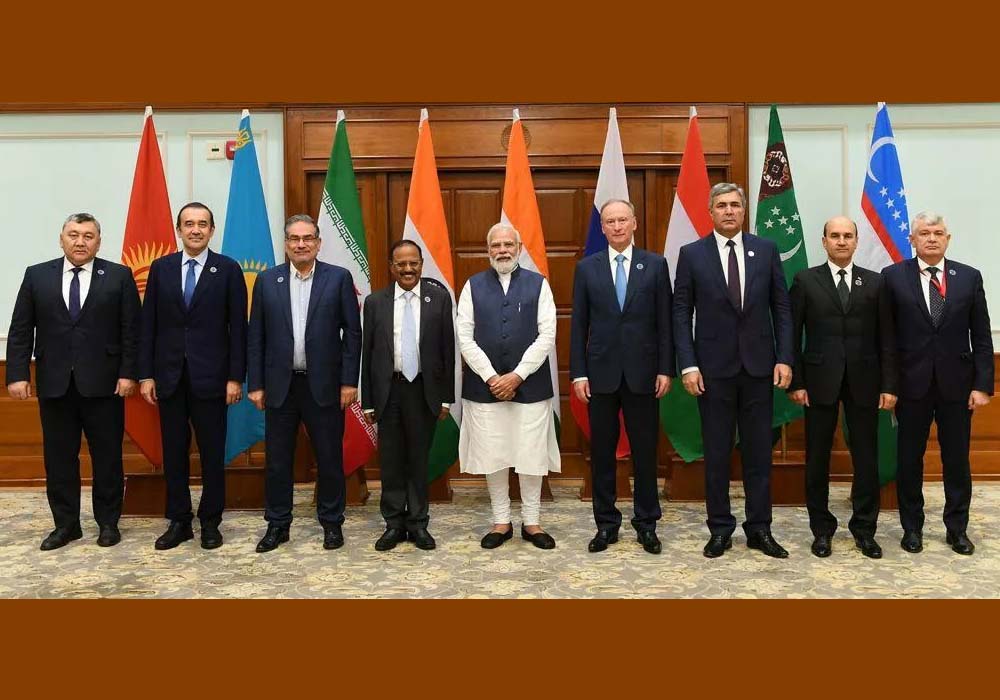This week, the Afghanistan issue remained an important agenda in the region, with India and Pakistan each pushing for their own diplomatic talks format, and the United States trying to deploy new military bases in Central Asia after the withdrawal of troops, and to balance against the rapidly growing influence of Russia and China in the region. Some believe that in the aftermath of the withdrawal of the US forces from Afghanistan, the influence of the United States is decreasing in the region, and Russia is filling some of that power vacuum, around which Moscow pursues a verified and profitable policy. At the same time, the situation in Afghanistan has prompted Russia to increase cooperation with China, as opposed to the United States in the region, while the same events have led China to adopt a new border law in order to prevent the inflow of extremism from Afghanistan. The European Union is also taking steps to become more actively involved in the region— the EU – Central Asia Economic Forum made it to the headlines this week, with the EU’s Global Gateway project, designed to counterbalance China’s Belt and Road Initiative and offer an alternative choice to the developing world.

Picture: Delhi Regional Security Dialogue on Afghanistan, Nov. 10 /Source: Sputnik
This week, a meeting on Afghanistan was held in the capital of India with Russia, Iran, and the five independent Central Asian states present. Pakistan and China refused to attend this meeting and held a separate round of talks for a political settlement in Afghanistan, where participants also included Russia and the United States (see: Reuters, Voice of America, The Hindu). While Russia was present at both forums, China’s absence in Delhi can be attributed to China's border disputes with India, as well as its unfavorable position with regard to India’s regional endeavors.
The situation in Afghanistan has become an occasion for Russia and China to strengthen bilateral relations in the Central Asian region as a whole (See: ANI, The War on Rocks). The cooperation between the Russian Federation and China on Afghanistan is rather political and diplomatic, and as a result, Russia and China have expanded contacts with both the Taliban and the Central Asian leaders.
China's new land border law is also affected by the situation in Afghanistan (See: Brookings, Voice of America). The new law reflects Beijing's concerns about the stability of its areas bordering Central Asia. The withdrawal of the U.S. troops and the Taliban's takeover have exacerbated Beijing's fears that Afghanistan, being in continuous unrest and humanitarian disasters, could become a hotspot of terrorism and extremism that could spread to Xinjiang.
As for Russia, the turn of Central Asia in its direction has been quite visible (See: Foreign Policy, Voice of America). After US troops left Afghanistan, Russia has become a more attractive partner for the Central Asian states - Kazakhstan, Kyrgyzstan, Tajikistan, Turkmenistan, and Uzbekistan. Unlike Western liberal democracies, Russia is not interested in discussing either human rights or democracy. Moreover, the peoples of Central Asia seem to have begun to feel nostalgic about the strength and stability that Russia promises them. It also helps that the Russian culture still plays an important role in the region. Ethnic Russians make up a fifth of the population of Kazakhstan, and despite the decrease in their numbers elsewhere (since they continue to migrate back to Russia), the use of the Russian language is widespread throughout Central Asia. Russian media, especially television, are the main sources of news here for many people. Russia has also become a useful and active security ally for the region in containing internal unrest, supporting the Tajik government during the civil war, and replacing Uzbekistan's military cooperation with NATO after the Andijan massacre.
The United States still does not plan to give up on the region and wants to be present through establishing military bases and counter the active interaction of the Central Asian states with China and Russia (See: The Washington Times, Warsaw Institute). The United States is seriously interested in deploying its military infrastructure in Central Asia. For several months, this issue has been actively worked out both through diplomatic channels and through the defense department. Independently, the United States is unlikely to be able to agree with the Central Asian states on establishing military facilities on their territory, as it was in the 2000s. In any case, such issues will have to be agreed upon not only with the leaders of the countries of the region, but also with the Russian Federation and China. Thus, with a high degree of probability, it can be predicted that Washington will instead continue to use the infrastructure of its allies and its bases located in the Persian Gulf region.
The EU – Central Asia Economic Forum was held in Bishkek, being the first meeting in a series of events that will be held in Central Asia in the coming years as part of the EU Strategy for Central Asia, adopted in 2019 (See: The Diplomat, Twitter, 24.kg). Strengthening the economic ties between the European Union and Central Asia is said to be a priority of the adopted strategy. The three main themes of the event were green recovery, digitalization, and improvement of the business environment.
The EU’s Global Getaway strategy is a response to China's Belt and Road Initiative, which will help the European Union build partnerships with the Central Asian states (See: The Diplomat, Bloomberg). The EU can ofcourse rely on US support, since they follow similar endeavors. However, the US administration also uses military-political mechanisms to pressure China, which is crucial to the Euro-Atlantic solidarity. In any case, the project aims either to duplicate existing transport and other infrastructure systems in order to create new routes free of Chinese control, or to oust Chinese capital from existing projects. However, given China's financial superiority, analysts are not optimistic about the outcome of these policies.

